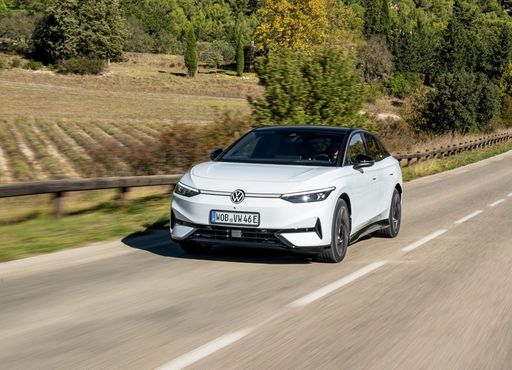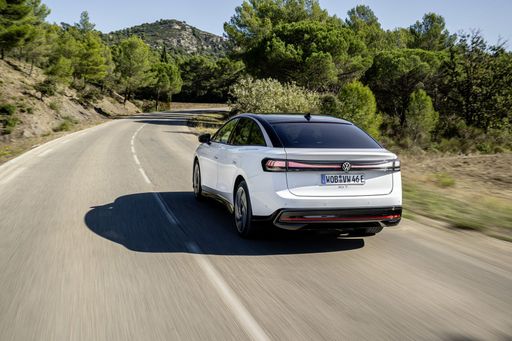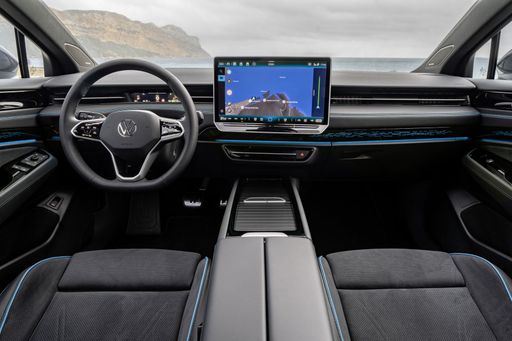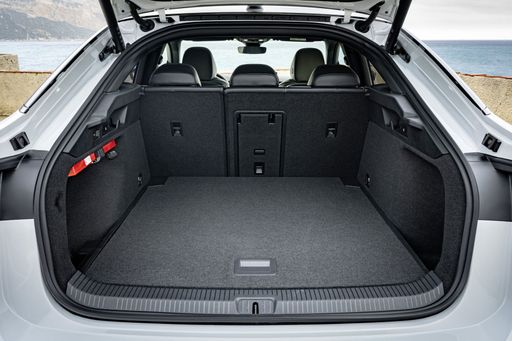Hyundai Tucson vs VW ID.7 – Differences & prices compared
Everyday use, family trips or long-distance drives – here’s where the differences show.
Discover whether Hyundai Tucson or VW ID.7 fits your lifestyle better.
Costs and Efficiency: Price and efficiency are key factors when choosing a car – and this is often where the real differences emerge.
Hyundai Tucson has a decisively advantage in terms of price – it starts at 30600 £, while the VW ID.7 costs 46400 £. That’s a price difference of around 15741 £.
As for range, the VW ID.7 performs significantly better – achieving up to 708 km, about 638 km more than the Hyundai Tucson.
Engine and Performance: Power, torque and acceleration say a lot about how a car feels on the road. This is where you see which model delivers more driving dynamics.
When it comes to engine power, the VW ID.7 has a clearly perceptible edge – offering 340 HP compared to 252 HP. That’s roughly 88 HP more horsepower.
In acceleration from 0 to 100 km/h, the VW ID.7 is clearly quicker – completing the sprint in 5.40 s, while the Hyundai Tucson takes 7.90 s. That’s about 2.50 s faster.
In terms of top speed, the Hyundai Tucson performs slight better – reaching 194 km/h, while the VW ID.7 tops out at 180 km/h. The difference is around 14 km/h.
There’s also a difference in torque: VW ID.7 pulls decisively stronger with 679 Nm compared to 367 Nm. That’s about 312 Nm difference.
Space and Everyday Use: Whether family car or daily driver – which one offers more room, flexibility and comfort?
Both vehicles offer seating for 5 people.
In curb weight, Hyundai Tucson is clearly lighter – 1520 kg compared to 2180 kg. The difference is around 660 kg.
In terms of boot space, the Hyundai Tucson offers somewhat more room – 620 L compared to 532 L. That’s a difference of about 88 L.
In maximum load capacity, the Hyundai Tucson performs to a small extent better – up to 1799 L, which is about 213 L more than the VW ID.7.
When it comes to payload, Hyundai Tucson somewhat takes the win – 545 kg compared to 465 kg. That’s a difference of about 80 kg.
Who wins the race?
The VW ID.7 proves to be dominates this comparison and therefore becomes our DriveDuel Champion!
VW ID.7 is the better all-rounder in this comparison.

VW ID.7
Hyundai Tucson
The Hyundai Tucson is a standout choice in the compact SUV segment, offering a perfect blend of style, comfort, and practicality. Its modern design is complemented by a spacious interior that provides ample room for passengers and luggage alike. With advanced technology and safety features, the Tucson ensures a smooth and enjoyable driving experience.
details @ hyundai.news
@ hyundai.news
 @ hyundai.news
@ hyundai.news
 @ hyundai.news
@ hyundai.news
 @ hyundai.news
@ hyundai.news
 @ hyundai.news
@ hyundai.news
VW ID.7
The VW ID.7 represents a significant step forward in Volkswagen's electric vehicle lineup, offering an elegant design combined with advanced technology features. This electric saloon showcases a sleek aerodynamic profile, prioritising both performance and efficiency. Inside, drivers will appreciate the spacious and modern cabin, equipped with intuitive controls and connectivity features for a seamless driving experience.
details @ Volkswagen.de
@ Volkswagen.de
 @ Volkswagen.de
@ Volkswagen.de
 @ Volkswagen.de
@ Volkswagen.de
 @ Volkswagen.de
@ Volkswagen.de

|

|
|
|
|
Costs and Consumption |
|
|---|---|
|
Price
30600 - 46300 £
|
Price
46400 - 54200 £
|
|
Consumption L/100km
1 - 6.9 L
|
Consumption L/100km
-
|
|
Consumption kWh/100km
-
|
Consumption kWh/100km
13.6 - 16.2 kWh
|
|
Electric Range
64 - 70 km
|
Electric Range
594 - 708 km
|
|
Battery Capacity
-
|
Battery Capacity
77 - 86 kWh
|
|
co2
22 - 156 g/km
|
co2
0 g/km
|
|
Fuel tank capacity
42 - 54 L
|
Fuel tank capacity
-
|
Dimensions and Body |
|
|---|---|
|
Body Type
SUV
|
Body Type
Hatchback
|
|
Seats
5
|
Seats
5
|
|
Doors
5
|
Doors
5
|
|
Curb weight
1520 - 1889 kg
|
Curb weight
2180 - 2325 kg
|
|
Trunk capacity
546 - 620 L
|
Trunk capacity
532 L
|
|
Length
4510 - 4520 mm
|
Length
4961 mm
|
|
Width
1865 mm
|
Width
1862 mm
|
|
Height
1650 mm
|
Height
1535 - 1536 mm
|
|
Max trunk capacity
1721 - 1799 L
|
Max trunk capacity
1586 L
|
|
Payload
525 - 545 kg
|
Payload
460 - 465 kg
|
Engine and Performance |
|
|---|---|
|
Engine Type
Diesel MHEV, Petrol MHEV, Petrol, Full Hybrid, Plugin Hybrid
|
Engine Type
Electric
|
|
Transmission
Automatic, Manuel
|
Transmission
Automatic
|
|
Transmission Detail
Dual-Clutch Automatic, Manual Gearbox, Automatic Gearbox
|
Transmission Detail
Reduction Gearbox
|
|
Drive Type
Front-Wheel Drive, All-Wheel Drive
|
Drive Type
Rear-Wheel Drive, All-Wheel Drive
|
|
Power HP
136 - 252 HP
|
Power HP
286 - 340 HP
|
|
Acceleration 0-100km/h
7.9 - 11.6 s
|
Acceleration 0-100km/h
5.4 - 6.6 s
|
|
Max Speed
180 - 194 km/h
|
Max Speed
180 km/h
|
|
Torque
265 - 367 Nm
|
Torque
545 - 679 Nm
|
|
Number of Cylinders
4
|
Number of Cylinders
-
|
|
Power kW
100 - 185 kW
|
Power kW
210 - 250 kW
|
|
Engine capacity
1598 cm3
|
Engine capacity
-
|
General |
|
|---|---|
|
Model Year
2024
|
Model Year
2023 - 2024
|
|
CO2 Efficiency Class
E, F, D, B
|
CO2 Efficiency Class
A
|
|
Brand
Hyundai
|
Brand
VW
|
What drive types are available for the Hyundai Tucson?
Available configurations include Front-Wheel Drive or All-Wheel Drive.
The prices and data displayed are estimates based on German list prices and may vary by country. This information is not legally binding.
